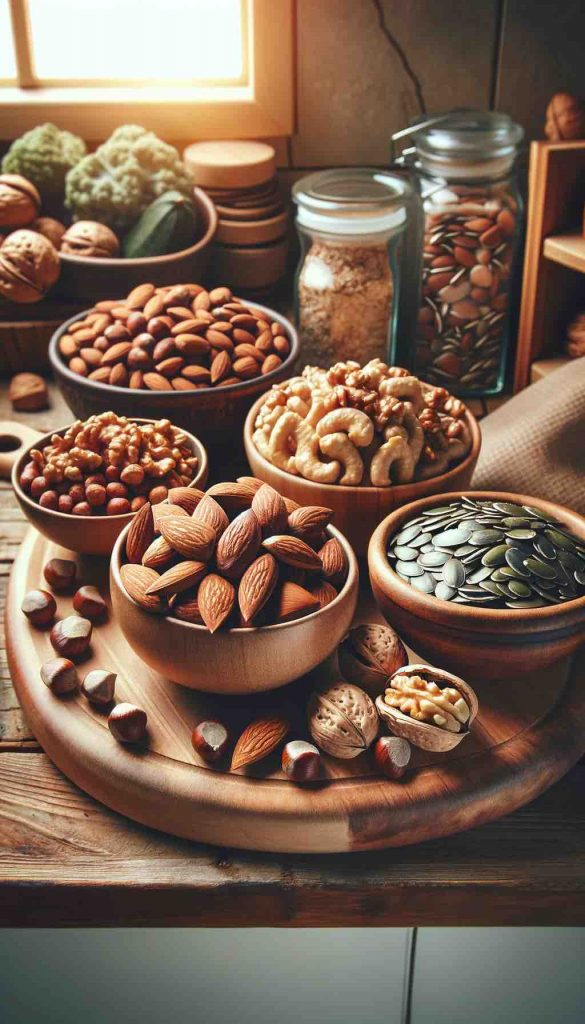
Introduction:
Hello and welcome to our Women’s Wellness series, where we delve into the transformative power of natural remedies for managing PMS. In this exciting journey, we’re shining the spotlight on an often-overlooked ally – healthy fats. Gone are the days when fats were the foes; today, they’re our friends, especially when it comes to combating the myriad symptoms of PMS.
For too long, the narrative around fats has been shrouded in misunderstanding. However, as we peel back the layers, we uncover their true potential in balancing hormones and soothing inflammation – two key culprits in the PMS saga. This post is more than just a guide; it’s a celebration of how simple dietary changes can bring about profound shifts in our wellbeing.
So, grab your favorite cup of tea, and let’s embark on this enlightening path towards understanding how integrating healthy fats into our diet can be a game-changer for women battling PMS.
The Essential Role of Healthy Fats in Hormonal Balance
When it comes to PMS, understanding our body’s hormonal landscape is key. It’s like navigating a complex maze where every turn can significantly affect our well-being. This is where healthy fats step in as invaluable guides, helping us find a path to hormonal harmony.
Why Healthy Fats Matter:
- Building Blocks of Hormones: Fats are not mere energy sources; they’re fundamental in creating and balancing hormones. Think of them as the architects of your hormonal health.
- Inflammation Reduction: Many PMS symptoms, like cramps and mood swings, are fueled by inflammation. Healthy fats, with their anti-inflammatory properties, act like a soothing balm, calming this internal turmoil.
Transforming PMS with Healthy Fats:
- Mood Stabilization: Fluctuations in hormones can send our moods on a rollercoaster. Fats like Omega-3s, found in flaxseeds and fatty fish, help smooth out these highs and lows.
- Cramp Relief: Instead of reaching for painkillers, try incorporating more Omega-3-rich foods into your diet. They’re natural pain relievers, reducing cramp intensity.
Empowering Our Bodies Through Diet:
It’s empowering to know that we can influence our hormonal balance through what we eat. By choosing the right fats, we’re not just feeding our bodies; we’re nurturing our hormonal health. It’s a form of self-care that goes beyond the plate, impacting how we feel every day of the month.
In the next section, we’ll dive into the specifics of these mighty fats and explore how to seamlessly incorporate them into our daily routines. From the tropical vibes of coconut oil to the nutty goodness of almonds and walnuts, get ready to discover a world of flavorful and beneficial options that cater to both your palate and your wellness.
Spotlight on Super Fats: Your Allies Against PMS
Let’s meet the superstars in the world of healthy fats. These aren’t just any fats; they’re the champions that can make a real difference in your battle against PMS.
Coconut Oil: The Tropical Hormone Helper
- Hormonal Conductor: Rich in medium-chain fatty acids, coconut oil is a key player in hormone production. It’s like a maestro, orchestrating the hormonal balance in your body.
- Inflammation Soother: Beyond hormone regulation, coconut oil has anti-inflammatory properties that can alleviate PMS-related pains and aches.
Omega-3 Rich Foods: The Mood Stabilizers
- Sources of Serenity: Flaxseeds, chia seeds, and fatty fish like salmon are packed with Omega-3 fatty acids, known for their mood-stabilizing effects. They’re like a calming sea breeze for your hormonal tempest.
- Pain Relief: These Omega-3 powerhouses are also natural pain relievers, offering respite from cramps and discomfort.
Avocado: The Creamy Comforter
- Monounsaturated Marvel: Avocados are loaded with monounsaturated fats, which are excellent for maintaining hormonal balance and overall health.
- Versatile and Delicious: Whether in a smoothie, on toast, or as a guacamole, avocados are a tasty way to boost your intake of good fats.
Nuts and Seeds: The Crunchy Crusaders
- Almonds, Walnuts, and More: A handful of these nuts not only satiates hunger but also provides Omega-3s and other beneficial fats.
- Snack Smart: They’re perfect as a snack or sprinkled on salads, making it easy to add a crunch of health to your day.
Olive Oil: The Mediterranean Secret
- Liquid Gold: Extra virgin olive oil is a staple in healthy diets, famed for its heart health and hormonal balance benefits.
- Salad’s Best Friend: Drizzle it over salads or use it in low-heat cooking for a dose of good fat.
Each of these fats brings something unique to the table, offering a symphony of benefits that can help alleviate PMS symptoms. The key is to incorporate a variety of these fats into your diet. This doesn’t mean overhauling your eating habits overnight; it’s about making small, sustainable changes that add up to a big impact on your hormonal health.
In the following sections, we’ll explore practical and delicious ways to include these super fats in your daily meals, turning each bite into an opportunity for well-being.

Crafting a Fat-Friendly Diet: Delicious Ways to Incorporate Healthy Fats
Now that we’ve met our fat heroes, let’s get creative in the kitchen! Incorporating these healthy fats into your daily diet can be both delicious and effortless. Here are some ideas to get you started:
Breakfast: Start Your Day Right
- Smoothie with a Twist: Blend some spinach, a small avocado, a tablespoon of coconut oil, and your favorite berries for a nutritious smoothie. It’s a creamy delight that packs a hormonal health punch.
- Nutty Oatmeal: Stir some chia seeds and sliced almonds into your morning oatmeal. Top with a drizzle of honey for a cozy, comforting start to your day.
Lunch: Light and Satisfying
- Avocado Salad: Toss together mixed greens, cherry tomatoes, cucumber, and slices of avocado. Add grilled chicken or salmon for protein, and dress with olive oil and lemon juice for a refreshing and filling lunch.
- Wrap it Up: Whole grain wraps filled with leafy greens, shredded carrots, slices of avocado, and your choice of protein (like grilled tofu or chicken) make for a satisfying, portable lunch.
Dinner: End the Day with a Nutrient Boost
- Salmon Delight: Grill or bake a salmon fillet with a sprinkle of herbs. Serve with quinoa and steamed broccoli or asparagus for a meal rich in Omega-3s and overall goodness.
- Stir-Fry with a Healthy Twist: Use olive oil for a vegetable stir-fry. Include a variety of colorful veggies and toss in some cashews or walnuts for an extra dose of healthy fats.
Snacks: Smart and Simple
- Nut Butter Celery Sticks: Spread almond or peanut butter on celery sticks for a crunchy, satisfying snack.
- Fruit and Nut Medley: Mix together a handful of walnuts, almonds, and your favorite dried fruits for a quick, energy-boosting snack.
Conclusion: A Journey of Flavor and Health
Incorporating healthy fats into your diet isn’t just about managing PMS; it’s a journey towards overall wellness. It’s about enjoying the flavors of natural, wholesome foods while nurturing your body. Remember, the key is balance and variety. Experiment with these ideas, and feel free to get creative with your recipes!
Your Turn: Share and Explore
We’d love to hear how you incorporate healthy fats into your diet. Do you have a favorite recipe or a special way of preparing these fat-rich foods? Share in the comments below! And stay tuned for our next post, where we’ll dive into the world of fruits and vegetables and their role in easing PMS symptoms.
FAQs for “Embracing Healthy Fats to Alleviate PMS Symptoms”
- How do healthy fats affect hormonal balance in women? Healthy fats play a crucial role in producing and regulating hormones. They provide essential building blocks that help maintain hormonal equilibrium, which can alleviate PMS symptoms.
- Can incorporating coconut oil into my diet help with PMS? Absolutely! Coconut oil is rich in medium-chain fatty acids, vital for hormone production. Its anti-inflammatory properties also help reduce PMS-related discomfort.
- Are Omega-3 fatty acids beneficial for managing PMS? Yes, Omega-3s, found in flaxseeds, chia seeds, and fatty fish, are excellent for stabilizing mood swings and reducing inflammation, making them highly beneficial for PMS management.
- What are some easy ways to include healthy fats in my diet? Simple ways include using olive oil as a salad dressing, snacking on nuts like almonds and walnuts, adding avocado to your meals, and incorporating coconut oil into your smoothies.
- Can changing my diet really make a difference in my PMS symptoms? Diet plays a significant role in managing PMS symptoms. Incorporating healthy fats can lead to noticeable improvements in hormonal balance and reduction in symptoms.
- Is it possible to get enough healthy fats from a vegetarian diet? Yes, vegetarian sources like avocados, nuts, seeds, and plant-based oils are excellent sources of healthy fats.
- Are there any healthy fats that also help with menstrual cramps? Omega-3 fatty acids are known for their natural pain-relieving properties, which can be effective in easing menstrual cramps.
- How much healthy fat should I include in my daily diet for PMS relief? The amount varies per individual, but including a portion with each meal, like a handful of nuts or a tablespoon of olive oil, is a good start. It’s best to consult with a nutritionist for personalized advice.
- Can healthy fats aid in mood stabilization during PMS? Yes, fats like Omega-3s help in mood regulation, which can be particularly beneficial during the mood swings often experienced in PMS.
- Are there any risks associated with consuming too many healthy fats? While healthy fats are beneficial, moderation is key. Excessive intake can lead to caloric surplus and weight gain. Balance them with other food groups for optimal health.
Blog Tags:
Women’s Wellness, Healthy Fats, PMS Relief, Hormonal Balance, Nutrition, Omega-3 Fatty Acids, Coconut Oil Benefits, Mood Stabilization, Anti-inflammatory Foods, Diet and Health, Natural PMS Management









